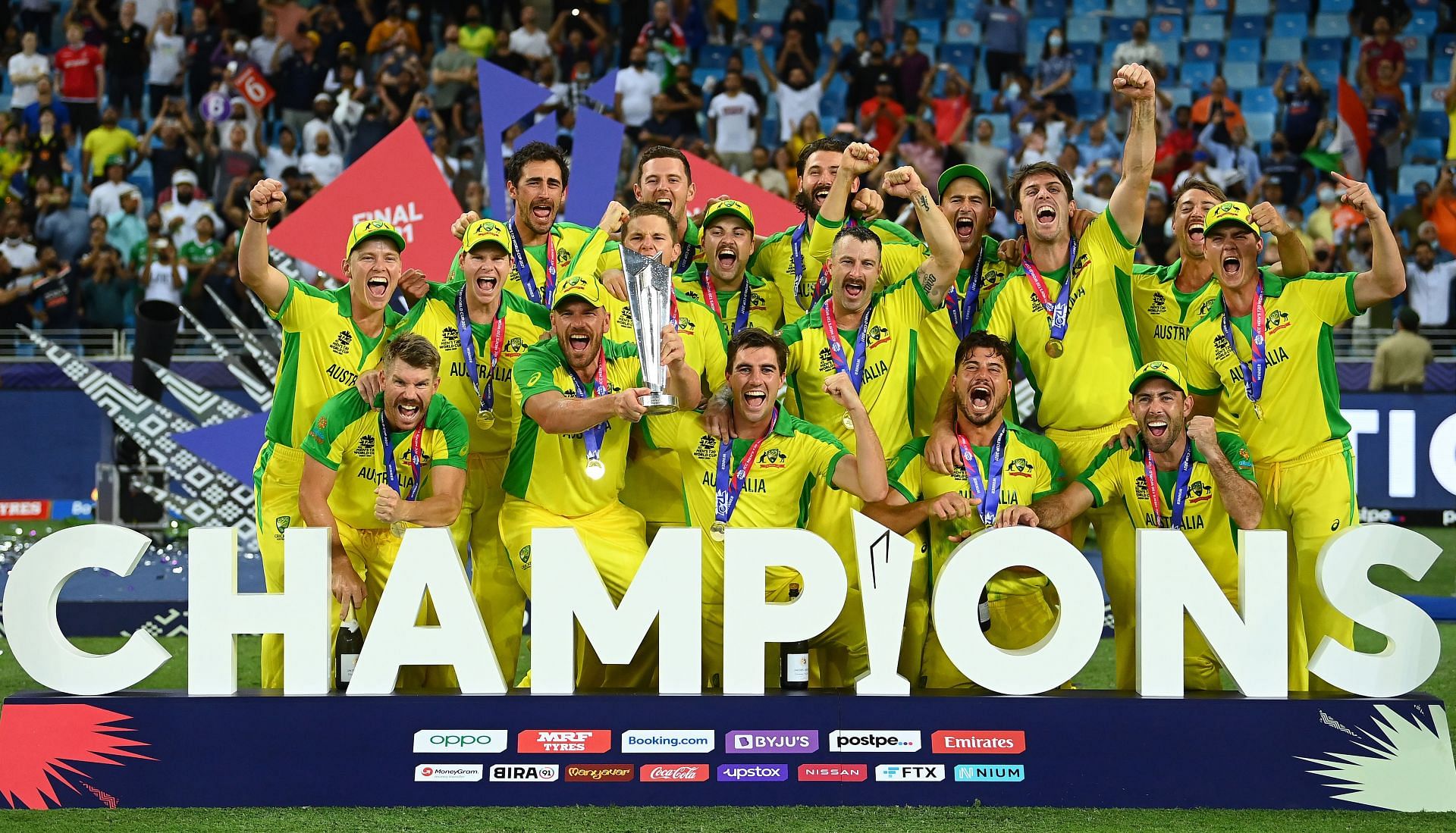Invincible and favourites are two terms that come to mind when thinking of the late 1990s and early 2000s. Whether it was Steve Waugh’s 1999 World Cup-winning team or Ricky Ponting’s teams that won the 2003 and 2007 World Cups, the Australian teams of that era had an aura of invincibility.
They started as favourites in every game they played, regardless of the conditions, game format, or opponents they were up against.
However, Aaron Finch’s team, which recently won the ICC T20 World Cup in the United Arab Emirates, were neither invincible nor favourites heading into this year’s tournament. Before the World Cup, Team Australia had a bad record in T20Is.
The humiliating setback in Australia’s home Test series against India at the start of 2021 set the tone for the rest of the year. Australia had struck rock bottom, losing 1-4 T20I series against the West Indies and Bangladesh. They lost a string of T20I series to New Zealand, the West Indies, and Bangladesh in the build-up to the main event.
Australia was far from the favourite to win the 2021 T20 World Cup before the tournament. Even the unusual conditions in the United Arab Emirates seemed to negate any possibility they had of making an impression at this year’s competition.
On the other hand, matches and competitions aren’t decided based on previous results and teams on paper, are they? Australia’s first T20 World Cup win is a testament to their tenacity, never give up mentality, and ability to keep together as a team.
The T20 World Cup-winning team led by Finch may not be as maverick, talismanic, or unbeatable as previous Australian squads. They do, however, share an important feature with their forefathers that is eerily similar to Australian culture.
Teams from Australia are known for being fierce and aggressive. Finch’s team exemplified this attribute throughout their triumphant run at this year’s T20 World Cup, conquering all difficulties in their path. They fight toe-to-toe till the end, looking their opponents in the eyes.
Their first Super 12 match set the tone for the rest of the season, as they stayed focused in vital moments to beat South Africa. Australia’s thrashing by arch-rivals England in their third Super 12 match was a significant wake-up call. They haven’t looked back since then.
They advanced to the semi-finals thanks to dominating performances against the West Indies and Bangladesh. But it was in the semi-finals against Pakistan, Matthew Wade and Marcus Stoinis dragged them back from the brink of defeat.
They were on the verge of losing to Pakistan around the 13-over mark after losing half of their team, with lots of runs to score and little time to do it. They weren’t ready to give up just yet, though. Wade and Stoinis’ toughness and champion-like attitude enabled them to cross the finish line to reach their second T20 World Cup final.
Australians don’t believe in losing, and they have a natural aptitude to find solutions when they’re in trouble. They do better when the stakes are more prominent. Their performance in the final versus Trans-Tasman for New Zealand demonstrates their ability to come through on big occasions.
At this year’s T20 World Cup, Australia always had someone to stand firm and weather the storm whenever they were in a difficult scenario.
David Warner, the tournament’s man of the match, had a poor run leading up to the main event. However, he was Australia’s batting heart and soul throughout the competition, scoring 289 runs in seven games. Despite his opening partner and captain Finch struggling for runs, Warner batted like a caged tiger and got his team off to a strong start. Warner made sure his team didn’t have to bear the brunt of his captain’s inconsistency.
Mitchell Marsh was the most exciting success story from the T20 World Cup this year. He was able to repay his team’s and fans’ faith in him over the years. The younger Marsh brother finally came into his own and was able to realize his potential fully.
Zampa, a leg-spinner, was a revelation in the event, taking 13 wickets. He did an excellent job of pinching the opposition batsmen in the middle overs.
After being thrashed by Pakistan in the semi-finals, Hazlewood was under pressure heading into the final, giving 49 runs off his four overs. He put everything behind him, though, to become one of Australia’s standout players in the final, returning with figures of 3-16 from his four overs.
The first-ever T20 World Cup victory for Australia is a fantastic example of players repaying their captain’s and team management’s faith in them. Australia’s starting lineup remained the same throughout the tournament, except their match against England, when Aston Agar replaced Mitchell Marsh in the starting lineup. For them, it paid off nicely.
In ICC event finals, Australia has always been a force to be reckoned with. On Sunday’s final, their overwhelming victory against New Zealand was only the latest in a long line of ruthless and powerful performances.
Except for the 2010 T20 World Cup, Australia had never lost in an ICC tournament final this century when England defeated them. They have won the 50-over World Cup events in 2003, 2007, and 2015 and the Champions Trophy in 2006 and 2009.
The only worldwide white-ball title missing from Australia’s trophy cabinet was the ICC T20 World Cup. Australia’s trophy cupboard is now complete after their resounding eight-wicket win over the Blackcaps in the final.





